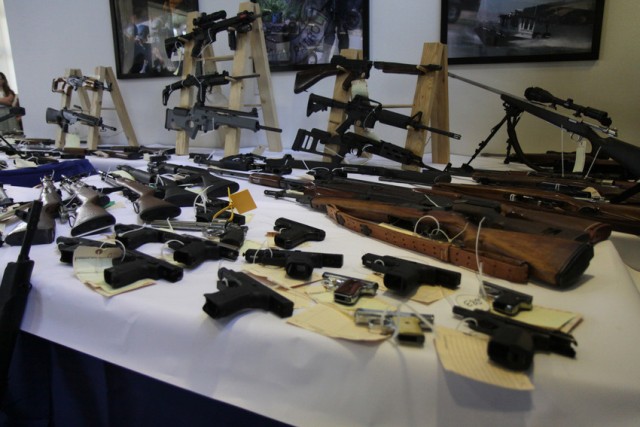The appeals ruling drew an angry response from Chuck Michel, one of the plaintiffs' attorneys. From Howard Mintz in the San Jose Mercury News:
Michel ... pledged to appeal to the U.S. Supreme Court, calling the ruling a "fundamental misapplication" of Second Amendment legal precedent. He also revealed that organizations plan to file a second legal challenge to the Sunnyvale law within the next week raising new legal arguments.
The stakes could be high, as other California cities, including Mountain View, San Francisco and Los Angeles, have moved to adopt similar regulations. And given that the 9th Circuit shapes law for nine western states, its Sunnyvale ruling is likely to have a much broader reach if it remains intact.
Tony Schoenberg, an attorney representing Sunnyvale in the case, said Wednesday he's confident that the law will stand up to further court scrutiny.
Central to the debate on large-capacity magazines is the Supreme Court's ruling in District of Columbia v. Heller, in which the justices ruled 5-4 that the city's ban on handguns violated the Second Amendment.
"In his decision, Justice Scalia made clear that many restrictions and limitations on gun ownership are still appropriate and consistent with the Second Amendment," Schoenberg said.
The court majority made a strong statement that "the Second Amendment protects an individual right to possess a firearm unconnected with service in a militia, and to use that arm for traditionally lawful purposes." But the court also found that Second Amendment rights are "not unlimited."
"They say the Second Amendment right is 'not a right to keep and carry any weapon whatever in any manner whatsoever and for any purpose,' " Schoenberg said. He added the ruling "goes on to say longstanding prohibitions on the possession of dangerous and unusual weapons have uniformly been recognized as falling outside the scope of the Second Amendment."
But opponents of the Sunnyvale ordinance say they're confident it will be struck down.
"We feel very strongly that the Supreme Court is getting to the point that they’re going to be sick and tired of appellate courts and district courts throughout the country literally ignoring" its rulings, said Sam Paredes, executive director of Gun Owners of California, one of the gun rights group that filed a friend of the court brief with the 9th Circuit.
"In the future, they will be making themselves perfectly clear," Paredes said.
Stanford law professor John Donohue said the 9th Circuit's ruling won't necessarily be a green light for cities considering similar legislation and they may wait until the case is finally decided. Part of the uncertainty is whether the Supreme Court will hear the case.
"Many jurisdictions don’t want to have to bear the burden of fighting the gun manufacturers," Donahue said. "They may wait to see what happens before they move ahead."
Donohue also served as an expert witness in the case.
"I was just asked to provide an empirical evaluation of the likely impact of regulations of this kind, and would they be beneficial in terms of reducing crime? Or might they have some adverse consequences?" Donohue said. "And in this case, I think it’s pretty clear that efforts to reduce the number of these high-capacity magazines is probably a good idea if you’re concerned about overall safety of the population."
Listen to an interview with Donohue about the 9th Circuit's decision below:
Here's the 9th Circuit panel's decision:
